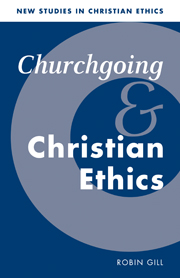Book contents
- Frontmatter
- Contents
- List of tables
- Preface
- List of abbreviations
- Introduction
- PART ONE THE THEORETICAL CONTEXT
- PART TWO THE EVIDENCE
- 4 The British Household Panel Survey
- 5 Faith in British Social Attitudes surveys
- 6 Moral Order in British Social Attitudes surveys
- 7 Love in British Social Attitudes surveys
- PART THREE THE IMPLICATIONS
- Postscript
- Works cited
- Index
7 - Love in British Social Attitudes surveys
Published online by Cambridge University Press: 02 December 2009
- Frontmatter
- Contents
- List of tables
- Preface
- List of abbreviations
- Introduction
- PART ONE THE THEORETICAL CONTEXT
- PART TWO THE EVIDENCE
- 4 The British Household Panel Survey
- 5 Faith in British Social Attitudes surveys
- 6 Moral Order in British Social Attitudes surveys
- 7 Love in British Social Attitudes surveys
- PART THREE THE IMPLICATIONS
- Postscript
- Works cited
- Index
Summary
Love is patient; love is kind and envies no one. Love is never boastful, nor conceited, nor rude; never selfish, not quick to take offence. Love keeps no score of wrongs; does not gloat over other men's sins, but delights in the truth. There is nothing love cannot face; there is no limit to its faith, its hope, and its endurance. Love will never come to an end … In a word, there are three things that last for ever: Faith, Hope and Love; but the greatest of them all is Love.
There is no possibility whatsoever of capturing this heavenly depiction of the Christian life in the crude nets of attitude surveys. Their function is to trawl through and test the relative strength of complex variables, but not to penetrate the deepest layers of moral character. Yet this very act of trawling should be able to detect the traces of love, but not of course the quality or depths of love, amongst the shoals of churchgoers.
It should be possible at least to see whether or not church-goers intend to put others first as they are instructed to in the Dominical Commands. The New Testament, Christian prayers and Christian liturgies are saturated with the theologic articulated so concisely in the Johannine Epistles, ‘Dear friends, since God so loved us, we also ought to love one another’, and so dynamically in the eschatological parable of the sheep and the goats:
When the Son of Man comes in his glory, and all the angels with him, he will sit on his throne in heavenly glory. […]
- Type
- Chapter
- Information
- Churchgoing and Christian Ethics , pp. 171 - 194Publisher: Cambridge University PressPrint publication year: 1999
- 1
- Cited by



